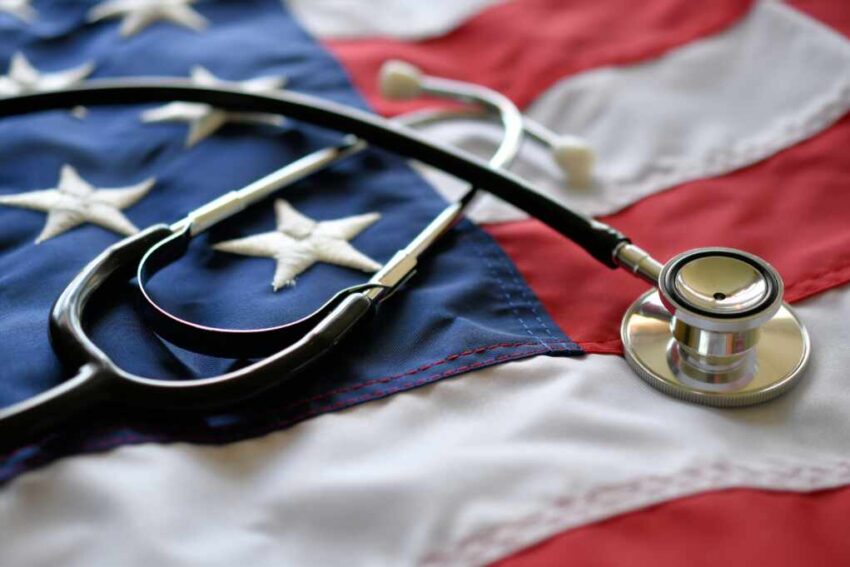Get ready for a seismic shift in healthcare as President Trump’s One Big Beautiful Bill Act (OBBBA) refocuses Medicaid on its original mission, sparking a fierce debate over the future of America’s safety net.
At a Glance
- OBBBA introduces work requirements and eligibility restrictions for Medicaid.
- The bill aims to curb federal spending and reduce Medicaid’s expansion.
- Critics fear up to 17 million could lose coverage, while supporters argue it’s a necessary correction.
- States are gearing up to implement new federal requirements amid potential legal battles.
Trump’s Vision for Medicaid
President Trump, in a move lauded by conservatives and decried by liberals, signed the OBBBA into law on July 4, 2025. The legislation introduces work requirements for certain Medicaid recipients, restricts eligibility, particularly affecting undocumented immigrants, and seeks to slow the ballooning federal spending on this program. The administration argues that these are not cuts but necessary refocusing efforts to return Medicaid to its original purpose: a safety net for the most medically vulnerable Americans.
Trump isn’t dismantling Medicaid—he’s refocusing it: cutting off illegal immigrants and reducing waste. Millions signed up in states like California and Oregon, but exec orders now bar unauthorized access. #MedicaidReform #PolicyShifthttps://t.co/8hAH5xSKOO
— American Thinker (@AmericanThinker) July 29, 2025
While critics claim these changes will strip millions of Americans of their health insurance, supporters argue that it’s a step towards personal responsibility and reducing unnecessary federal intervention. This realignment aligns with conservative values of limited government and fiscal responsibility, emphasizing Medicaid’s intended role as a temporary safety net rather than an endless entitlement.
Historical Context and Current Challenges
Medicaid, established in 1965, was originally designed to provide medical assistance to a small, vulnerable segment of the population. Over the years, however, federal mandates and expansions, particularly under the Affordable Care Act, have ballooned the program to cover nearly a quarter of the U.S. population. This has sparked intense debates about the sustainability and intent of the program.
Recent political shifts, including a Republican-controlled Congress and White House, have enabled the passage of the OBBBA, a move aimed at reversing previous expansions. The COVID-19 pandemic further complicated the landscape, as emergency measures led to a surge in Medicaid enrollment. Now, the challenge lies in implementing these reforms while balancing state flexibility and federal oversight.
States and Stakeholders in the Mix
The implementation of OBBBA falls on states, which administer Medicaid programs. They must now navigate new work requirements and eligibility checks, a task that presents both administrative challenges and opportunities for increased autonomy. While some states welcome the flexibility, others fear the loss of federal funding and the burden of increased bureaucracy.
Healthcare providers and insurers are also key players in this unfolding drama. They face potential financial instability as shifts in Medicaid coverage could lead to increased uncompensated care. Advocacy groups, on the other hand, are gearing up for legal challenges, arguing that these reforms could devastate vulnerable populations and widen health disparities.
The Road Ahead: Implications and Political Battles
In the short term, up to 17 million people could lose their Medicaid or subsidized coverage, according to estimates from the Kaiser Family Foundation. This has raised alarms about potential increases in the uninsured rate and the associated social and economic costs. However, proponents of the OBBBA argue that slowing federal Medicaid spending is a critical step towards addressing the nation’s fiscal health.
The political implications are equally significant. The OBBBA sets the stage for future debates over the balance of power between federal and state governments in managing safety-net programs. As states begin to implement these changes, the conversation will undoubtedly shape upcoming elections, where healthcare remains a pivotal issue.
Click this link for the original source of this article.
Author: Editor
This content is courtesy of, and owned and copyrighted by, https://conservativeamericatoday.com and its author. This content is made available by use of the public RSS feed offered by the host site and is used for educational purposes only. If you are the author or represent the host site and would like this content removed now and in the future, please contact USSANews.com using the email address in the Contact page found in the website menu.





